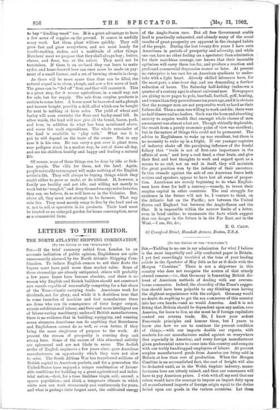LETTERS TO THE EDITOR.
THE NORTH ATLANTIC SHIPPING COMBINATION.
(To THE EDITOR OF TEM "SPECTATOR.") SIR,—If the brief summary cabled from London be an accurate indication of public opinion, Englishmen are quite unnecessarily alarmed by the North Atlantic Shipping Com- bination. To induce English owners to sell their fleets the buyers must have paid more than market value. Some of these steamships are already antiquated, others will probably a few years hence have become obsolete, and there is no reason why English and Scotch builders should not construct new vessels capable of successfully competing for a fair share of the Transatlantic carrying trade. Americans work for dividends, not for glory, and while it is doubtless true that in some branches of machine and tool manufacture there are firms who can (in consequence of their larger output, minute subdivision of labour, and freer and more intelligent use of labour-saving machinery) undersell British manufacturers, there is no evidence that in building, equipping, and running ocean steamers Americans can do anything that Scotchmen and Englishmen cannot do as well, or even better, if they bring the same singleness of purpose to the work. At present the stream of prosperity is running deep and strong here. Some of the causes of this abnormal activity are ephemeral and are not likely to recur. The foolish strike of English engineers a few years since gave American manufacturers an opportunity which they were not slow to seize. The South African War has transferred millions of British capital to American pockets, and for a generation the United States have enjoyed a unique combination of favour- able conditions for building up a great agricultural and indus- trial nation,—first, for a time limitless virgin soil ; second, a sparse population ; and third, a temperate climate in which white men can work strenuously and continuously for years, and what is perhaps their largest asset, the cultivated energy of the Anglo-Saxon race. But all free Government arable land is practically exhausted, and already many of the usual results of great prosperity are apparent in the changed habits of the people. During the last twenty-five years I have seen Americans in periods of prosperity and adversity, and while one can have no other feeling (as a spectator) than admiration for their matchless courage, one knows that their incurable optimism will carry them too far, and produce a reaction and profound commercial depression sooner or later. At present no enterprise is too vast for an American syndicate to under- take with a light heart. Already skilled labourers have, for the most part, a nine-hour day, and are demanding a further reduction of hours. The Saturday half-holiday (unknown a quarter of a century ago) is almost universal now. Newspapers are giving more pages to polo, baseball, football, golf, boating, and tennis than they gave columns ten years ago, and it is obvious that the younger men are not prepared to work as hard as their fathers did. Then a man was willing to work and die; there were no half-timers and no loafers. Such was the keen and absorbing anxiety to acquire wealth that amongst whole classes of men amusement was almost a lost art. Though ethically deplorable, the result from a purely economic point of view was excellent; but in the nature of .things this could not be permanent. The advice to Englishmen to wake up was excellent, but there is no necessity to wake up in a fright. If our younger captains of industry shake off the paralysing influence of the feudal fallacy that " trade is not of first-rate importance in the affairs of men," and keep a cool head, a clear brain, and give their first and best thoughts to work and regard sport as a means to an end, not an end in itself, they will maintain the great position won by the industry of their ancestors. In this crusade against the sale of our American liners both writers and speakers appear to have lost all sense of propor- tion. Americans are merely beginning to do what English- men have done for half a century,—namely, to invest their surplus capital in other countries. The real struggle for existence in the future will not be, I venture to think, on the Atlantic but on the Pacific ; not between the United States and England but between the Anglo-Saxon and the Slay. It is impossible within the narrow limits of a letter, even in brief outline, to enumerate the facts which suggest that our danger in the future is in the Far East, not in the West.—I am, Sir, &c., E. G. CREW.
63 Crawford Str'eet, Humbolt Avenue, Boston, U.S.A.










































 Previous page
Previous page